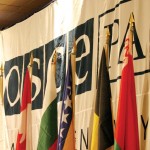 In recent days tragic events in southern Kyrgyzstan has resulted in over 1000 dead (unofficial estimates suggest up to 2,000), 2,000 injured and about one million displaced refugees. The humanitarian crisis in Kyrgyzstan threatens to de-stabilise Central Asia, a key geo-political region for security and energy. The Kyrgyzstani government and the international community recognise that the situation in Osh and Jalalabad remains tense, and a fresh wave of violence can flare up at any moment. But the government lacks the military capacity to contain the violence.
In recent days tragic events in southern Kyrgyzstan has resulted in over 1000 dead (unofficial estimates suggest up to 2,000), 2,000 injured and about one million displaced refugees. The humanitarian crisis in Kyrgyzstan threatens to de-stabilise Central Asia, a key geo-political region for security and energy. The Kyrgyzstani government and the international community recognise that the situation in Osh and Jalalabad remains tense, and a fresh wave of violence can flare up at any moment. But the government lacks the military capacity to contain the violence.
We, citizens and friends of Kyrgyzstan, want to re-establish peace, order and security in the country OSCE, the United Nations and the European Commission and other international institutions to assist Kyrgyzstan in achieving the following objectives:
International Security Assistance
The situation in Osh and Jalalabad remains very volatile, and a large number of weapons are in the hands of criminal groups. Tensions and fear have spread to the capital, Bishkek, and other parts of the country, where people are anticipating an explosion of violence. An international stabilisation mission is urgently needed to prevent fresh violence, to establish security, and to provide space for reconciliation and trust amongst the communities. The security mission needs to be in the country until the repatriation of the displaced is completed, and to ensure the success of the parliamentary elections.
Effective Humanitarian Assistance
Many homes in southern Kyrgyzstan have been destroyed, and electricity, water and food supplies have been disrupted. Many displaced families also have no homes to return to. Kyrgyzstan needs urgent assistance with the reconstruction of homes and general infrastructure. In addition, Kyrgyzstan needs a large-scale humanitarian aid in the form of food, medicine, water, clothes and well-being support.
International Investigation
We urge international organisations to set up an independent commission to conduct an inquiry into the events, then to bring the perpetrators to justice, and to help with the reconciliation process. The commission should consist of impartial experts, who are renowned for their integrity and judiciousness.
We look forward to hearing from you.
Yours sincerely,
Dr Balihar Sanghera, University of Kent
Dr. Madeleine Reeves University of Manchester
Dr. Sarah Amsler, Aston University
Dr. John Heathershaw, University of Exeter
Elmira Satybaldieva, University of Kent
Kanykei Bayalieva-Jailobaeva, University of Edinburgh
Mohira Suyurkulova, University of St. Andrews
Gulzat Botoeva, University of Essex
Jeanne Feaux de la Croix, University of St. Andrews
Dr Stefanie Ortmann, University of Sussex
Hugh Cameron Leonard Govan, University of Essex
Aisalkyn Botoeva, Brown University, USA
David Levy, Boston University, USA
Dr. Sally N. Cummings, University of St. Andrews
Dr. Nick Megoran, University of Newcastle
Dr. Johan Rasanayagam, University of Aberdeen
Rebecca Reynolds, Glasgow University
Professor John Schoeberlein, Harvard University
Dr. Gül Berna Özcan, Royal Holloway, University of London
Dr Vanessa Ruget, Salem State College, USA
Dr Tatiana Yarkova, Central European University
Professor Deniz Kandiyoti, School of Oriental and African Studies
Dr Bhavna Dave, School of Oriental and African Studies
Burul Usmanalieva, Organisation for Cooperation and Security in Europe
Dr Matteo Fumagalli, Central European University
Dr Nathan Lyte, Max Planck Institute
Elina Karakulova, Central European University
Jamilya Jeenbaeva, London School of Economics
Selbi Djumaeva, University of Essex
Mehrigiul Ablezova, American University Central Asia, Kyrgyzstan
Medet Tiulegenov, American University Central Asia
Ashat Dukenbaev, Kent University, USA
Olga Tarabashkina, KU Leuven
Aibek Iliasov, University of Edinburgh
Altynai Osmoeva, Central Saint Martins College of Art and Design
Emilbek Joroev, University of Maryland, USA
Medina Aitieva, American University Central Asia
Burul Usmanalieva, Central European University
Aksana Ismailbekova, Max Planck Institute
Sona Saroyan, University of Sussex
Zulfiya Satimbay, Cambridge University
Rahat Joldoshalieva, University of Toronto
Shairbek Joroev, American University Central Asia
Assel Baltynova, London School of Economics
Maya Kim, Central European University
Sophie Cohen, Oxford University
Ulan Shabynov, School of International Trading
Salem Bajnajd, University of Kent
Muhabat Mahmudova, London School of Economics
Nurgul Kurmanbekova, London School of Economics
Krushil Watene, University of St. Andrews
Tamar Sukhishvili, Oxford University
Jevgenij Koltsov, University of St. Andrews
Andreas Stokke, University of St. Andrews
Joan Hodges, University of Essex
Zou Yessentayeva, Universite Jean Muolin Lyon
Katarina Buck, University of St. Andrews
Umit Cetin, London School of Economics
Reeta Tovanen, University of Helsinki
Guljan Arslan, Oxford University
Taryn Sheppard, University of St. Andrews
Umberto Zorzi, University of Bologna
Aida Bekturova
Aida Tynystanova
Zyldyz Wood
Aigul Imankulova
Uma Mamarasulova
Saina Otorbaeva
Zeinolla Kalymbetov
Hikoyat Salimova
Dinara Faizuldaeva
Masuma Akbarova
Aleko Kupatadze
Ermeka Maksotova
Kasym Rahkmankulov
Askar Sheraliev
Shahzoda Nazimova
Muhtor Hasanov
Tina Abdrasulova
Maksat Korooluev
Damon Golriz
Zeinolla Kalymbetov
Gafurova Nigora, American University in Central Asia
Inoyathon Sadikova, Columbia University
The Uzbeks of Kyrgyzstan Group (167 members)
http://www.facebook.com/pages/Uzbeks-of-Kyrgyzstan/126259537412507
Stop Violence and Massacre in Kyrgyzstan Group (3002 members)
http://www.facebook.com/pages/Uzbeks-of-Kyrgyzstan/126259537412507#!/group.php?gid=129672393720652&ref=ts
Umsumaya Abaydullah, Monetary Donations in Osh city
Sardor Zokirov, Uzbek Initiative Efforts
Zukhra Ikramova, In Kind Monetary Donations to Refugees in Uzbekistan



